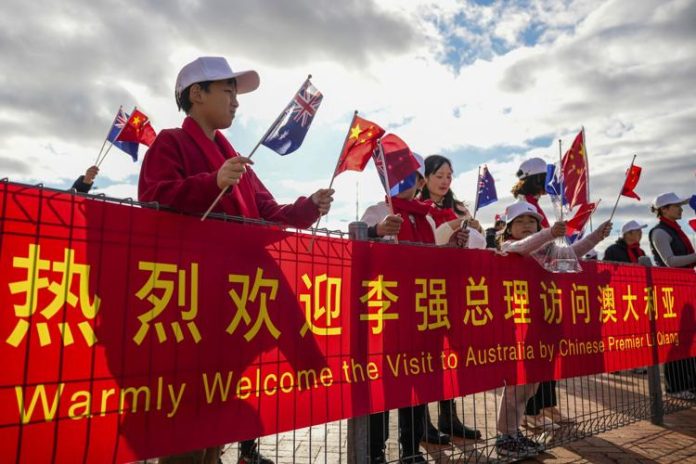Chinese Premier Li Qiang arrived in Australia on a relationship-building mission, according to Associated Press.
The Chinese politician will visit Adelaide Zoo and a Chinese-controlled lithium processing plant in the Kwinana Beach industrial estate, as well as Australia’s parliament building, during a visit that will end on Tuesday. Li may announce the pandas will be replaced by another breeding pair after they return to China in November, according to the Adelaide Advertiser newspaper.
The visit is the first by a Chinese premier in seven years and should pave the way for the first trip by a Chinese leader to Australia since 2014. Panda diplomacy, stone lobsters and China’s global dominance in the critical mineral sector are on the agenda. Trade Minister Don Farrell said:
I’d be very confident that the visit this week will result in a very successful outcome for lobster producers.
Prime Minister Anthony Albanese said that during the annual leaders’ meeting on Monday he would discuss with Li the recent clashes between the two countries’ militaries in the South China Sea and Yellow Sea, which Australia believes endangers Australian personnel.
Li plans to visit Tianqi Lithium Energy Australia’s Tianqi Lithium processing plant in Western Australia state on Tuesday to highlight China’s commitment to investing in critical minerals, according to media reports. The plant manufactures battery-grade lithium hydroxide for electric vehicles.
China-Australia relations
China initiated a reset in bilateral relations after the election of centre-left Labour Party Prime Minister Anthony Albanese in 2022. Nonetheless, the relationship gradually faded for nearly a decade when the previous conservative administration was in power over the legislation. In particular, the administration excluded Chinese-owned telecoms giant Huawei from deploying a national 5G network due to security concerns and Australia’s call for an independent investigation into the causes and response to the COVID-19 pandemic.
In 2020, Beijing imposed a series of formal and informal trade restrictions on a range of Australian exports, including coal, wine, barley and timber, worth up to 20 billion Australian dollars ($13 billion) a year. However, as of today, all trade bans have now been lifted except for Australia’s live lobster exports. Trade Minister Don Farrell predicted that these barriers would also come down soon after Li’s visit with Chinese Trade Minister Wang Wentao.
Another controversial development, Australia echoes the United States’ concerns about Chinese dominance in the extraction of critical minerals that are important components of the world’s transition to renewable energy.
The Chinese premier left New Zealand on Saturday, ending a three-day visit to a country with which China has more harmonious relations than Australia. Li described China and New Zealand as “good friends.” Next stop will be Malaysia, where bilateral relations have become further strained by competing territorial claims in the South China Sea.
